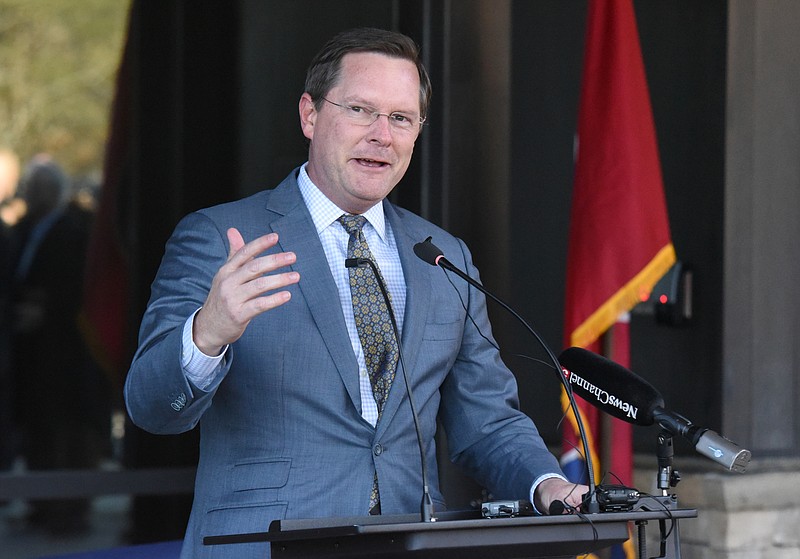NASHVILLE - A bill moving in the Tennessee House would allow students, faculty and staffers to sue public universities and colleges if they believe they are being punished for refusing to accept one or more "divisive concepts" that the legislation says "exacerbate and inflame divisions" over race, sex, ethnicity and religion.
House Bill 2670, sponsored by House Speaker Cameron Sexton, R-Crossville, easily cleared its first hurdle on a voice vote Tuesday in the GOP-controlled House Higher Education Subcommittee. It now moves to the full Education Committee.
The panel's two Democrats, Rep. Yusuf Hakeem of Chattanooga and Rep. Antonio Parkinson of Memphis, spoke against the bill and audibly voted "no."
Presenting the bill for Sexton in subcommittee was House Assistant Majority Leader Ron Gant, R-Rossville, who called it "an initiative that is near" to the speaker.
"This legislation ... is an effort to ensure that our public universities' credible diversity efforts aren't undermined by initiatives that seek to drive Tennesseans further apart," Gant said. "In Tennessee, we believe that prosperity is greatly aided by progress towards unity, and we reject the promotion of concepts that attempt to cast a shadow on groups of people due to factors not in their control."
Definitions in the bill for what constitutes a "divisive concept" include stating that one race or sex is "inherently superior or inferior to another" and that an individual by virtue of race or sex is "inherently privileged, racist, sexist or oppressive whether consciously or subconsciously."
Other concepts identified as divisive under the bill include a belief that an individual "should be discriminated against or receive adverse treatment" because of the individual's race or sex as well as that someone's "moral character is determined by the individual's race or sex."
Also singled out as divisive is that a person "by virtue of the individual's race or sex, bears responsibility for actions committed in the past by other members of the same race or sex" and that someone "should feel discomfort, guilt, anguish or another form of psychological distress solely because of the individual's race or sex."
Another provision identified as divisive is that a "meritocracy is inherently racist or sexist, or designed by a particular race or sex to oppress another race or sex."
In a similar bill last year, the legislature set in place financial penalties for K-12 school districts that teach the same basic set of concepts.
At the college level, House Bill 2670 would allow the concepts to be presented. But the legislation proposes that a student or employee "shall not be required to endorse a specific ideology or political viewpoint to be eligible for hiring, tenure, promotion or graduation, and institutions shall not ask the ideological or political viewpoint of a student, job applicant, job candidate or candidate for promotion or tenure."
Those who believe the law has been violated "may pursue all equitable or legal remedies that may be available to the individual" in court, the bill states.
Colleges and universities, meanwhile, are required to investigate complaints of violations. If the institution finds a violation has occurred, then the institution "shall take appropriate actions under the policies and procedures."
Beginning in January, higher education public institutions would be required to report annually the number of complaints, findings and actions taken.
Another requirement: Each public institution of higher education would be required to conduct a biennial survey of the institution's students and employees "to assess the campus climate with regard to diversity of thought and the respondents' comfort level in speaking freely on campus, regardless of political affiliation or ideology."
The institution would be required to publish the results of the biennial survey on its website.
Objections presented
Parkinson raised concerns about the measure, saying, "I hope we can actually get or stay in the space where we freely are able to discuss all of these issues because that's what's going to bring healing for our country. I also want to ensure that no one is intentionally made to feel uncomfortable because we don't want people to grow up uncomfortable. But we also want to make sure truth is being spoken inside in our classrooms and universities."
"Unfortunately," Parkinson added, "some of our history is uncomfortable, and it's not all good. But the truth needs to be spoken, and I just hope we're not stifling that with any legislation that comes before this body."
Gant said, "This does not limit the discussion, just the requirement on something agreeing with a certain ideology in order to graduate. That's what this cuts out."
Hakeem cited earlier statements by proponents about having "free and open dialogue," and then questioned Gant further about what that means in the context of the Holocaust.
"I'm trying to be clear ... about dealing with both sides of an issue," Hakeem said. "If we use the Holocaust as an example, how does that dialogue take place where you talk about both sides?"
Replied Gant: "This protects that exchange, there's nothing that limits you from that dialogue. ... Rep. Hakeem, the only way I have to describe this is that this bill does not stifle that free exchange of ideas. This legislation is to protect that."
Another bill provision states that a public institute of higher education cannot conduct any mandatory training of students or employees if the training includes one or more "divisive concepts."
And, if a higher education institution employs someone whose primary duties include diversity, "then the duties of such employees must include efforts to strengthen and increase intellectual diversity among the students and faculty of the public institution of higher education at which they are employed."
The bill states that it would not prohibit public institutions of higher education from training students or employees on the non-discrimination requirements of federal or state law.
Nor, the bill says, is it intended to infringe on the U.S. Constitution's First Amendment's rights to freedom of speech nor infringe on the rights of academic freedom of facility.
It would also would not require any employee of a public institution to violate any state law or regulation. Nor does it prohibit an individual who provides training from responding to questions regarding one or more divisive concepts, "so long as the response does not endorse or advocate for divisive concepts."
Senate Judiciary Committee Chairman Mike Bell, R-Riceville, is carrying the Senate companion bill in the upper chamber.
Contact Andy Sher at asher@timesfreepress.com or 615-255-0550. Follow him on Twitter @AndySher1.

